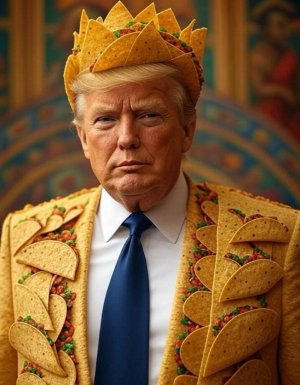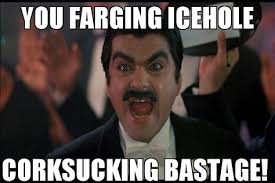Rubbish.
Tariffs on goods imported to the United States are typically paid by the U.S. importer, not the foreign exporter. Here's how it works:
- Importers Pay Directly: When a tariff is imposed, the U.S. company or entity importing the goods is responsible for paying the tariff to U.S. Customs Service at the point of entry. This increases the cost of the imported goods.
- Cost Passed to Consumers: Importers often pass on the increased costs to U.S. consumers in the form of higher prices for goods. For example, if a tariff raises the cost of imported steel, manufacturers using that steel may increase prices for products like cars or appliances.
- Supply Chain Impacts: Businesses may absorb some costs to remain competitive, but this can reduce profit margins. Alternatively, they might seek cheaper suppliers or shift production, which can disrupt supply chains and affect jobs.
- Economic Ripple Effects: Higher prices can reduce consumer purchasing power, potentially slowing economic growth. Conversely, tariffs may protect domestic industries by making foreign goods less competitive, potentially benefiting local producers.
- Foreign Exporters: While exporters don’t directly pay the tariff, they may face reduced demand for their goods in the U.S. market due to higher prices, which can hurt their revenue.
Who Bears the Cost?
- Consumers: Pay higher prices for goods affected by tariffs.
- Importers/Businesses: Face increased costs and may see reduced profits or need to adjust supply chains.
- Domestic Producers: May benefit from less competition but could face retaliatory tariffs from other countries.
- Foreign Exporters: Lose market share if their goods become too expensive.
Real-World Example: Studies on the 2018-2019 U.S. tariffs on Chinese goods (e.g., by the National Bureau of Economic Research) found that American consumers and businesses bore over 90% of the cost through higher prices and supply chain disruptions, with minimal direct impact on Chinese exporters.
WHAT DO ECONOMISTS THINK?
Most economists are critical of broad tariffs, like those proposed or implemented by the Trump administration, arguing they harm the U.S. economy more than they help. Here’s a breakdown of the prevailing views based on economic research and expert opinions:
Why Most Economists Oppose Broad Tariffs
- Increased Costs for Consumers: Tariffs are taxes paid by U.S. importers, often passed on to consumers through higher prices. Studies from the 2018-2019 Trump tariffs, such as those on Chinese goods, showed that U.S. consumers bore over 90% of the cost through price increases. For example, a 2018 tariff on washing machines raised prices by about $86 per unit, costing consumers $1.5 billion annually.bbc.com
- Inflationary Pressure: Economists warn that tariffs, like the 10% universal tariff and higher rates on countries like China (up to 145% in 2025), could drive inflation. Estimates suggest a 1% increase in the effective tariff rate raises core PCE prices by 0.1%, potentially pushing inflation to 4% from current levels. This could hit lower-income households hardest, with estimates of $1,000-$2,148 in added annual costs.cbsnews.com
- Economic Growth and Job Losses: Broad tariffs are projected to reduce U.S. GDP and wages. The Penn Wharton Budget Model estimated that Trump’s April 2025 tariffs could cut GDP by 6-8% and wages by 5-7%, with a middle-income household facing a $22,000-$58,000 lifetime loss. Studies from Trump’s first term found tariffs reduced manufacturing employment by a net 2.7% due to higher input costs and retaliatory tariffs.budgetmodel.wharton.upenn.educnbc.com
- Retaliatory Tariffs: Foreign countries often respond with their own tariffs, hurting U.S. exporters. A 2020 study estimated $27 billion in U.S. export losses from 2018-2019 retaliatory tariffs. This disrupts industries like agriculture and manufacturing, which rely on global markets.taxfoundation.org
- Trade Deficit Misconceptions: Trump’s focus on reducing bilateral trade deficits is criticized as misguided. Economists argue deficits are driven by macroeconomic factors like government spending and investment flows, not just trade policies. Tariffs may reduce imports but also harm exports, leaving the trade deficit largely unchanged.nytimes.com
- Supply Chain Disruptions: Tariffs on integrated supply chains, like the auto industry with Canada and Mexico, raise costs and disrupt production. Economist Jim Stanford noted that auto parts can cross borders multiple times, and a 25% tariff could damage both U.S. and Canadian industries.tcf.org
Minority Support for Tariffs
A small group of economists and analysts support targeted tariffs for specific goals:
- Oren Cass (American Compass): Argues tariffs can incentivize domestic manufacturing and strengthen supply chain security, particularly against China. He sees them as a tool to address the hollowing out of industrial regions, though he acknowledges implementation challenges.nytimes.combbc.com
- Jeff Ferry (Coalition for a Prosperous America): Supports tariffs to boost U.S. industry and national security, arguing they can protect jobs in strategic sectors.bbc.com
- Potential Negotiation Tool: Some, like Cass, suggest tariffs could be used as leverage to secure better trade deals, though this depends on consistent policy and successful negotiations.nytimes.com
Mixed Perspectives
- Historical Context: Supporters like Trump’s team cite historical precedents, such as tariffs during the U.S.’s industrial rise in the 1800s, but economists note that modern economies are far more globalized, making comparisons less relevant. The Smoot-Hawley Tariff of 1930, for example, deepened the Great Depression by reducing trade.cnbc.com
- Short-Term vs. Long-Term: Some economists acknowledge tariffs might protect specific industries or jobs in the short term but argue the long-term costs—higher prices, reduced growth, and global trade disruptions—outweigh these benefits.pbs.org
- Political Strategy: Analysts like Jason Furman note that Trump’s tariffs may serve political goals, like signaling action on trade imbalances or immigration, rather than purely economic ones. This can create uncertainty, deterring long-term business investment.hks.harvard.edu
Recent Developments (2025)
- Trump’s “Liberation Day” tariffs (April 2025), including a 10% baseline tariff and higher rates on specific countries, have been criticized for destabilizing markets and raising recession risks. The International Monetary Fund and Federal Reserve Chair Jerome Powell warned of slower U.S. and global growth.@AP@AP
- Some tariffs were paused or adjusted after pushback, suggesting flexibility, but the uncertainty has already lowered consumer and business confidence.reuters.com
- A few economists, like Torsten Sløk, have reconsidered their initial skepticism, suggesting tariffs might yield strategic benefits if carefully managed, but this remains a minority view.@MarioNawfal
Consensus
The vast majority of economists (e.g., 93% in a survey during Trump’s first term) believe broad tariffs harm American consumers and businesses more than they help, with costs like higher prices, slower growth, and job losses outweighing benefits to protected industries. Supporters see potential in targeted tariffs for strategic or political goals, but even they caution against broad, indiscriminate applications






